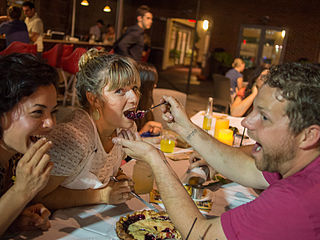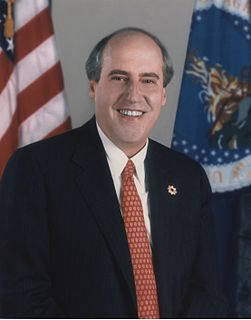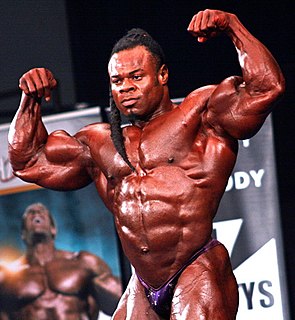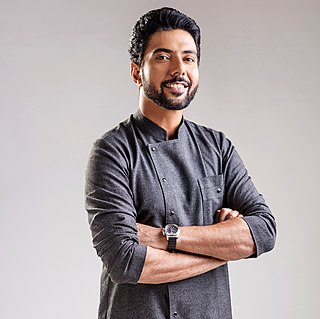A Quote by David Sax
Food trends have been around as long as people have had the ability to choose between different things to eat, but the modern, interconnected media has made food trends a viral phenomenon. Once upon a time, it was just a few newspapers and a few select gourmet magazines that were writing about food. Today, it's every single publication.
Quote Topics
Ability
Ability To Choose
About
Around
Been
Between
Choose
Different
Different Thing
Different Things
Eat
Every
Few
Food
Gourmet
Had
Interconnected
Just
Long
Made
Magazines
Media
Modern
Newspapers
Once
Once Upon A Time
People
Phenomenon
Publication
Select
Single
Things
Time
Today
Trends
Viral
Were
Writing
Related Quotes
I make my food in such a way that people can eat it every single day. My dad passed away from a heart attack, so it's always been very important for me to make food I love, the food we made growing up, but in a way that it won't be harmful to my body or to the people I love. Just as long as it's not boring. It has to be flavorful and delicious.
We need to realize that these industrial methods of farming have gotten us used to cheap food. The corollary of cheap food is low wages. What we need to do in an era when the price of food is going up is pay better wages. A living wage is an absolutely integral part of a modern food system, because you can't expect people to eat properly and eat in a sustainable way if you pay them nothing. In fact, it's cheap food that subsidized the exploitation of American workers for a very long time, and that's always been an aim of cheap food.
Secretly in my heart, I believe food is a doorway to almost every dimension of our existence. ... Food never was just food. From the time a cave person first came out from under a rock, food has been a little bit of everything: who we are spiritually as well as what keeps us alive. It's a gathering place, and in the best of all worlds it's possible that when people of one country sit down to eat another culture's food it will open their minds to the culture itself. Food is a doorway to understanding, and it can be as profound or as facile as you would like it to be.
Bad food is made without pride, by cooks who have no pride, and no love. Bad food is made by chefs who are indifferent, or who are trying to be everything to everybody, who are trying to please everyone... Bad food is fake food... food that shows fear and lack of confidence in people's ability to discern or to make decisions about their lives.
Bad food is made without pride, by cooks who have no pride, and no love. Bad food is made by chefs who are indifferent, or who are trying to be everything to everybody, who are trying to please everyone. Bad food is fake food, food that shows fear and lack of confidence in people's ability to discern or to make decisions about their lives.
I spend so much money on food, just getting the food for me is a tremendous expense, so there's no way I could even think about paying for supplements. I think of all supplements as food derivative anyway, so If I can only choose between getting the food or the supplements I'd rather opt for the food.
Imagine if we had a food system that actually produced wholesome food. Imagine if it produced that food in a way that restored the land. Imagine if we could eat every meal knowing these few simple things: What it is we're eating. Where it came from. How it found its way to our table. And what it really cost. If that was the reality, then every meal would have the potential to be a perfect meal.
Our early 21st century civilization is in trouble. We need not go beyond the world food economy to see this. Over the last few decades we have created a food production bubble-one based on environmental trends that cannot be sustained, including overpumping aquifers, overplowing land, and overloading the atmosphere with carbon dioxide.
Those of us who think about what we eat, how it's grown, those of us who care about the environmental impact of food - we've been educated by fabulous books, like Fast Food Nation and documentaries like Food Inc. But despite these and other great projects that shine a critical light on the topic, every year the food industry spends literally tens of millions of dollars to shape the public conversation about our food system.
Isn't food important? Why not "universal food coverage"? If politicians and employers had guaranteed us "free" food 50 years ago, today Democrats would be wailing about the "food crisis" in America, and you'd be on the phone with your food care provider arguing about whether or not a Reuben sandwich with fries was covered under your plan.
Food is "everyday"-it has to be, or we would not survive for long. But food is never just something to eat. It is something to find or hunt or cultivate first of all; for most of human history we have spent a much longer portion of our lives worrying about food, and plotting, working, and fighting to obtain it, than we have in any other pursuit. As soon as we can count on a food supply (and so take food for granted), and not a moment sooner, we start to civilize ourselves.






























